|
|
|
Sort Order |
|
|
|
Items / Page
|
|
|
|
|
|
|
| Srl | Item |
| 1 |
ID:
164980
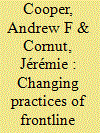

|
|
|
|
|
| Summary/Abstract |
This article develops the concept of ‘frontline diplomacy’ – what practitioners referring to work in embassies, consulates, and permanent representation as ‘the field’ –, defined here as all diplomats’ activities taking place away from headquarters. IR scholarship tends to focus on Ministries of Foreign Affairs located in capitals. On the contrary, building on the practice turn in IR, we first show that international politics emerge from frontline practices. Adding to criticism against the practice turn, we then explain that it has missed important transformations occurring in frontline diplomacy because it tends to privilege stability over change. We finally discuss two innovations in frontline practices: the action of Sherpas in G20 summits following the 2008 crisis and the use of Twitter by US Ambassador to Russia Michael McFaul (2012–14). For each we answer three questions: How do these activities transform traditional modes of operation? How are non-state actors involved in them? What do they tell about transformation of global politics? Because diplomatic practices at the frontlines epitomise international politics, these new directions for inquiry contribute substantively to IR scholarship. At the theoretical level, they enrich the continuing encounter between IR and diplomatic studies through practice theory and help to understand change in practice.
|
|
|
|
|
|
|
|
|
|
|
|
|
|
|
|
| 2 |
ID:
090461
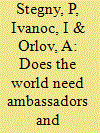

|
|
|
| 3 |
ID:
165779
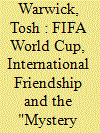

|
|
|
|
|
| Summary/Abstract |
Article Type: Research Paper Purpose:This article explores the evolution of international bonds between Middlesbrough in the northeast of England and North Korea arising from the participation of the North Korean men's football team at the 1966 FIFA World Cup. Shedding new light on the origins of this example of sporting diplomacy, this research seeks to understand the dynamics of international relations enacted at a local level and highlights the role of key individuals and institutions in facilitating this connection between the town and North Korea into the twenty-first century. Design, Methodology, Approach:Beginning with an assessment of early interactions between Middlesbrough and North Korea, this paper analyzes the way in which the relationship has been articulated and developed across several decades. Drawing upon local authority archives, historic newspaper collections, oral history and private collections, this study brings together hitherto underexplored resources, including North Korean diplomatic correspondence and interviews with the footballers of 1966, to deconstruct the multilayered mechanisms, meanings and motivations that underpin the Middlesbrough-Pyongyang relationship. Findings:Focusing chiefly on the role of British agency in North Korea-UK interactions, this research reveals the combination of local sporting conditions, international relations and individual and institution engagement in constructing bonds between Middlesbrough and North Korea since 1966. In doing so, the article draws out some of the peculiar local, economic and political factors that have shaped and nurtured the sporting, pseudodiplomatic connections between Pyongyang and Teesside. Practical Implications:This study highlights the important role that sport can play in harnessing new international interactions and understandings between peoples from different cultural and political systems. The power of football and bonds created at a local level (in this case Middlesbrough) to help nurture international diplomatic relations and embrace common transnational interests is also considered, as are the limitations of what might be considered a strand or extension of sports diplomacy. Originality, Value:Expanding beyond the existing literature on sports diplomacy, mega events and official interactions between North Korea and the UK, this article utilizes hitherto unpublished historical documentation and new oral testimony to bring a new perspective on the benefits and challenges posed by interactions across international borders facilitated by sport, both at the FIFA World Cup in 1966 and in recent decades.
|
|
|
|
|
|
|
|
|
|
|
|
|
|
|
|
| 4 |
ID:
188899
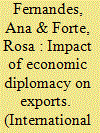

|
|
|
|
|
| Summary/Abstract |
It is widely recognized that exports contribute to economic growth. Many governments have seen economic diplomacy representation (foreign offices, embassies and consulates) as an important tool to diminish export barriers and foster economic growth. Thus, this study aims at understanding to what extent does the presence of Portuguese economic diplomatic representation in foreign states impact Portuguese exports. Based on merchandise exports to 144 countries for the period between 2008 and 2018, and using a quasi-gravity model of trade, results indicate that ceteris paribus, Portugal exports more to countries which host a Portuguese office and an increase in the number of offices in a foreign country positively affects exports to that country.
|
|
|
|
|
|
|
|
|
|
|
|
|
|
|
|
| 5 |
ID:
188909
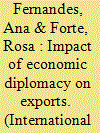

|
|
|
|
|
| Summary/Abstract |
It is widely recognized that exports contribute to economic growth. Many governments have seen economic diplomacy representation (foreign offices, embassies and consulates) as an important tool to diminish export barriers and foster economic growth. Thus, this study aims at understanding to what extent does the presence of Portuguese economic diplomatic representation in foreign states impact Portuguese exports. Based on merchandise exports to 144 countries for the period between 2008 and 2018, and using a quasi-gravity model of trade, results indicate that ceteris paribus, Portugal exports more to countries which host a Portuguese office and an increase in the number of offices in a foreign country positively affects exports to that country.
|
|
|
|
|
|
|
|
|
|
|
|
|
|
|
|
| 6 |
ID:
184038
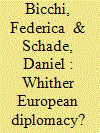

|
|
|
|
|
| Summary/Abstract |
The article analyses the evolution of European diplomacy over two decades, to assess the impact of the European External Action Service (EEAS) creation alongside consecutive waves of enlargement. Data is drawn from two original datasets about European Union (EU) member states’ diplomatic representations within the EU and across the globe. It shows that member states have maintained and strengthened their substantial diplomatic footprint across the EU’s territory, expanding it to include new members and making Brussels a diplomatic hub also for non-member countries. In parallel, and despite the establishment of the EEAS, member states have maintained and even increased their networks of diplomatic representations across the globe, alongside more numerous and more politically active EU Delegations (EUDs). At the same time, member states have been reducing their diplomats’ numbers, as the cases of Austria, France, Germany and Italy show. This delicate balancing act has been made possible not only by contemporary technological developments, but also by European cooperation, as in the case of EUDs hosting member states’ representations in non-member countries, a development referred to as co-location. Therefore, whereas the continued presence of national embassies on the ground could be interpreted as detracting from the EEAS, the existence of EUDs contributes also to other, more indirect but certainly novel, forms of diplomatic cooperation under a single European roof.
|
|
|
|
|
|
|
|
|
|
|
|
|
|
|
|
|
|
|
|
|